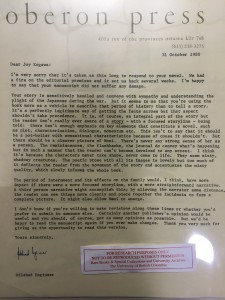Hello everyone,
These past few weeks, we have been reading Joy Kogawa’s Obasan in our ASTU class. Obasan is a historical fiction novel about the experience of Japanese-Canadians during World War II from the eyes of Naomi, the narrator who looks back to her childhood memories of this event. Last week we went with my ASTU class to the UBC archives in the Irving K. Barber Learning Center. It is a beautiful place that holds within its walls the answers to questions we often philosophize about when we read, such as what was the author’s view on a certain character. We often question the choices and the background of the author and in the archives last week I found more about Joy Kogawa than any number of Wikipedia searches could have provided. In the archives, the Joy Kogawa Fond contain documents that she donated and these include drafts of the book, notes and outlines, letters from editors, and letters from readers, including Prime Minister Trudeau, among others.
In class and in general, we study Joy Kogawa and her work and in the process of studying her, I have come to notice, we idealize her and view her as someone who wrote a priceless and amazing novel. In the archives, I found a letter from a publisher and you may see the image of said letter below.
Reading this letter, I came to view Kogawa as a normal author, who like every other author who wishes to be published, was criticized and rejected. Her work is, without a doubt amazing and compelling, but it is not perfect and this is something that I had to be reminded of with this document. The publisher who wrote this letter after reading Kogawa’s book told her that he would like her to revise certain elements of the novel and resubmit it for them to consider publishing it or that she should send it to other publishers for their opinion. He also argues that, “The reader isn’t really ever aware of a story-with a focused storyline- being told: there isn’t enough emphasis on key elements that constitute a novel” (Engineer). He then goes on to state that “there should be a clearer picture of Nomi. There’s never any strong sense of her as a person” (Engineer). He finds many flaws in this version of Obasan, flaws that I would strongly disagree with. Although I am not certain if the version he looked at is the same as the one that ended up being published, his judgments towards Kogawa’s work are not something I would not have though of had it not been for this letter.
Reading this letter, I realized that in rejection letters, the tone of the publisher or editor is similar to that portrayed by a professor grading a student’s paper, where the goal is to help the writer improve style and content but these messages are often received with drops of bitterness and sorrow. After thinking it over I found that although Obasan is an amazing novel that has been acclaimed by many, it can and was criticized as any other piece of writing can be.
Thank you for reading and I hope you have a great day!
Andrea Barraza
Works Cited
Engineer, Dilshad. Letter from Dilshad Engineer to Joy Kogawa. 31 October 1980. Box 11 File 1. Joy Kogawa fonds. University of British Columbia Library Rare Books and Special Collections, Vancouver, Canada.
